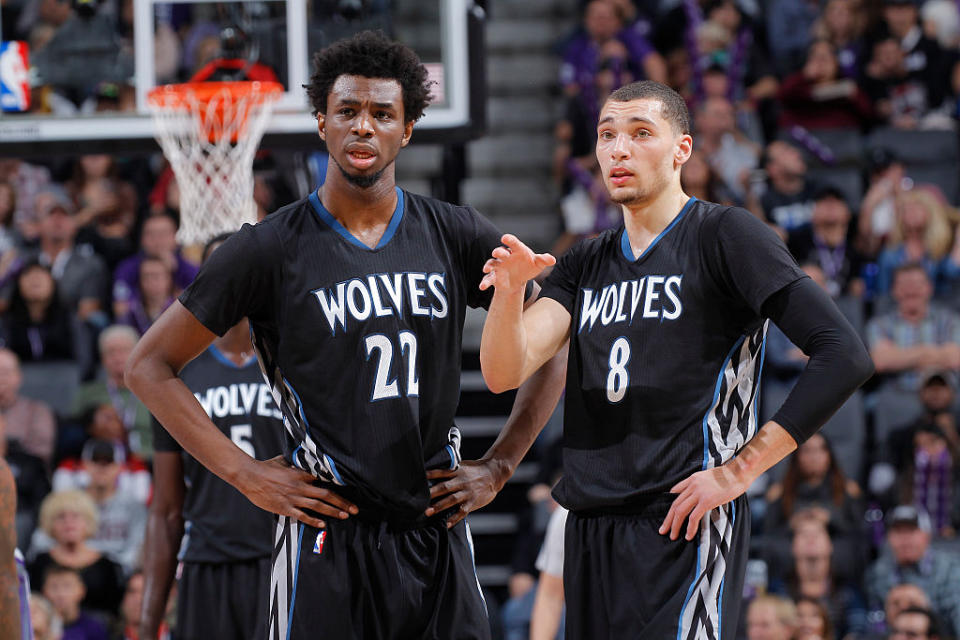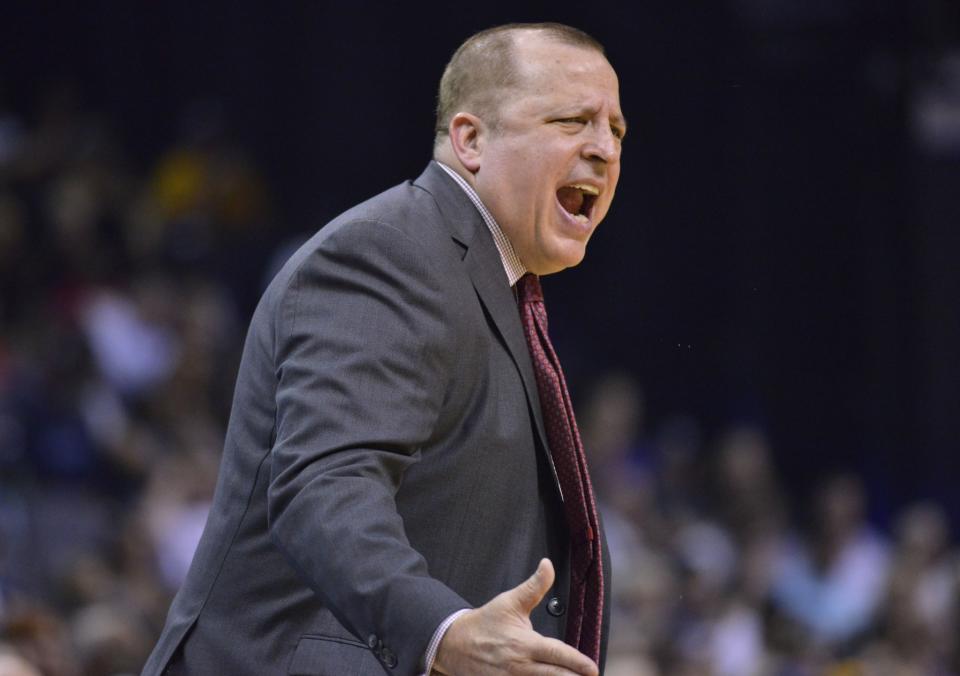Winning isn't easy, and the Wolves are learning the hard way

Three weeks into the 2016-17 NBA season, the Minnesota Timberwolves have at times had the look of the Next Big Thing. Reigning Rookie of the Year Karl-Anthony Towns continues to stake his claim to star status, his very presence suggesting a redefinition of what big men are capable of doing. His RoY precedessor, Andrew Wiggins, has turned in explosive performances suggesting he might be ready to make The Leap.
Zach LaVine has averaged just under 20 points per game and scorched the nets at a nearly 47 percent clip from 3-point land, suggesting last year’s post-All-Star surge was more a fact than a fluke. A rotation stocked with dudes who can’t rent a car without getting hassled has turned in the NBA’s third-most-potent offense, averaging 109.9 points per 100 possessions, below only the All-Star-studded Golden State Warriors and Toronto Raptors, suggesting the emergence of a monster ready to shake the league to its studs.
[Join a Yahoo Daily Fantasy Basketball contest now | Free NBA Yahoo Cup entry]
Thus far, though, “suggestions” are all Minnesota has. The Wolves enter Thursday’s nationally televised tilt against Rookie of the Year favorite Joel Embiid and the Philadelphia 76ers at 3-7, and coming off a dispiriting Tuesday night home loss to the Charlotte Hornets that saw Minnesota squander a 14-point lead during a dismal third quarter to send Kemba Walker, Nicolas Batum and company to a strong road win.
Those third-quarter collapses have been the story of the season for Tom Thibodeau’s club. As Wolves color commentator Jim Petersen noted, the young Wolves have been pretty damn impressive in the other three frames thus far. Minnesota has blown opponents’ doors off in the first and second quarters, outscoring them by a respectable 4.6 points per 100 possessions in the fourth … and getting boat-raced by 37 points-per-100 coming out of intermission. Minnesota has lost the third quarter in nine of its 10 games and in all seven of its losses, and by at least 10 points in five of those defeats.
There are caveats to weigh when considering the Wolves’ statistical profile, headlined by the small 10-game sample size and the fact that said sample includes a 36-point win over a Memphis Grizzlis team that played without Mike Conley and Marc Gasol. The Wolves, though, can’t be willing to wait and see whether their post-halftime struggles will just even out as the season wears on; they’ve got to find answers today, right now, and man, are they searching.
“I feel like we get too cool,” Wiggins said, according to Jace Frederick of the St. Paul Pioneer Press. “Like, we come out too cool, we see the score, we see we’re up, so we think we have a cushion. But any good team is going to make that run in the third. We can either make that run and push the lead to 20 and make the game over, or they can make that run.”
“We gotta fix it before it turns bad,” LaVine said, according to Jerry Zgoda of the Minneapolis Star-Tribune. “Because we’re playing really well, and it just turns and ruins the whole game. It ruins all our spirits. Going into the next game you feel like you’ve got it figured out. We’re up 15, 12 points and we’re going good and it’s just a nosedive.’’
The cratering has been especially stark on the defensive end, the side of the ball on which most expected the Wolves to take a massive leap forward under their new head coach.

Thibodeau came to the Twin Cities with a 255-139 career regular-season record and having led the Chicago Bulls to five straight playoff appearances on the strength of defenses that finished first, first, fifth and second in points allowed per possession in his first four years on the bench. Through 10 games, though, his young charges remain as unable to get stops as they appeared under Sam Mitchell, ranking 28th among 30 NBA teams in defensive efficiency, dead last in opponents’ field-goal percentage, and in the bottom third of the league in putting opponents on the free throw line, points allowed off turnovers, second chance points allowed, fast-break points conceded and points given up in the paint.
[Follow Dunks Don’t Lie on Tumblr: The best slams from all of basketball]
As Thibodeau sees it, many of the Wolves’ woes can be traced back to singular sins, according to Frederick:
“You’re not going to guard guys individually,” the coach said. “It comes down to your ball pressure, your ability to swing the floor, everybody moving on the fly to the ball. Getting inside the lane. There are no shortcuts to it. And then you have to protect the paint and get out and cover the line, and finish with the rebounding.
“Right now, we get the initial part but not the second and third part. We have to have the ability to sustain that.”
Several Wolves seem to believe that individual-over-collective approach has helped short-circuit Minnesota on the other end of the court, too, according to Zgoda:
“We have a lot of talent, we know we can score in a lot of ways,” [point guard Ricky] Rubio said. “But if we don’t play as a team, it’s a waste of time. We try to play hero ball at one point when things aren’t working. It should be the other way around. It should be playing as a team.” […]
“It’s natural when something happens to want to save the day, to want to be the hero who makes the shot and gets the momentum going,” Wiggins said. “We want it, but easier said than done. We have to do it.”

While no Wolf singled out a member of the pack for such transgressions, Britt Robson of MinnPost points out that the criticisms fit nearly into the reality of how superstar-in-the-making Towns has started the season:
While Towns has upped both the frequency and the accuracy of his three-point shot — he’s making 37.2 percent of 4.3 treys per game, compared to 34.1 percent of 1.1 long range attempts per game last season — his overall [effective field goal percentage] has declined because he is missing much more often from two-point territory — dropping from 55.9 percent to 51.9 percent inside the arc.
Get a little deeper inside that shooting data and you see that “hero ball” plays a factor in this decline. When the score is close, he frequently tries to take matters into his own hands, with negative results.
According to basketball-reference.com, when the two teams are within five points of each other, Towns’ field goal percentage plummets to 43.6, compared to 48.6 when the margin is 6-10 points and 52.4 when the gap is more than 10 points. More telling, the percent of his made field goals that are assisted by a teammate goes from 84.6 when the margin is greatest, to 64.7 when the margin is 6-10 points, down to just 52.9 percent when the score is within five points.
In other words, there is a correlation between the accuracy of Towns’ shot and the frequency with which he is assisted by his teammates — and both significantly diminish as the score gets closer. It indicates that Towns is relying less often on passes from his teammates in tight games and foolishly trying to do it himself.
No one questions Towns’ accountability and willingness to take responsibility. After the Hornets loss, he told reporters, “I look myself in the mirror, I have to do more. I haven’t done enough. Those losses fall on me. I’ve got to do more. I’ve got to be smarter. I’ve got to do better.” At issue, though, is whether that lesson is the right one for Towns and the Wolves to take. From Jon Krawczynski of The Associated Press:
“A big part of learning is trial and error. So when you go through something and it doesn’t work, you should learn from it,” Thibodeau said after a 115-108 loss to the Hornets on Tuesday. “The second time around, it shouldn’t be the same way. That has to change and it has to change fast.” […]
“This is the best team I’ve ever been around,” said point guard Ricky Rubio, in his sixth season with the Wolves. “I get mad thinking that we’re wasting time. We’re not learning. It’s time to change.”
There’s plenty of time for Thibs to get his players pulling in the same direction, and plenty of reason for optimism as Minnesota’s talented young players continue to stretch the boundaries of their games. But Rubio’s right: the time for getting comfortable with the uncomfortable stuff — battling instinct to hew to the fundamentals of the defensive system, preventing yourself from trying to make the spectacular play, trusting that that’s OK because your teammate has your back, etc. — is now. Without that foundation of self-sacrifice and collective belief, the already difficult task of going from 29 wins to the playoffs may well be impossible.
The Wolves have more than enough ability to become the team of our dreams. To get there, though, they’ll have to learn how to win … and to get there, they’ve got to learn how to learn.
More NBA coverage:
– – – – – – –
Dan Devine is an editor for Ball Don’t Lie on Yahoo Sports. Have a tip? Email him at devine@yahoo-inc.com or follow him on Twitter!
Stay connected with Ball Don’t Lie on Twitter @YahooBDL, “Like” BDL on Facebook and follow Dunks Don’t Lie on Tumblr for year-round NBA talk, jokes and more.


